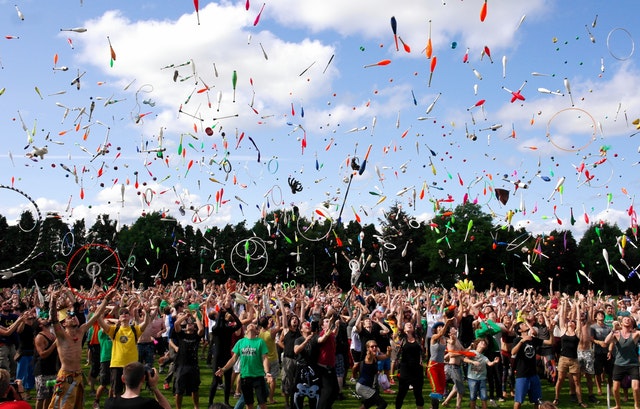How To Organise A Sports Event Tips on how to organise a sporting event
Sporting events are a year-round occurance, but have you ever wondered how much planning goes into such an event? Sometimes it can take days, weeks and even months or years to organise. Here, with family-owned cycle helmets retailer, Leisure Lakes Bikes, we look at exactly what is required to make sure your event or competition goes off without a hitch:
Choose your perfect venue and date
Before you start to imagine what your event will entail and begin to ask participants to sign up, you must make sure you have somewhere suitable to host your event and pick a suitable date. Local parks and playing fields where your club is based will be great places to start, though it’s important to check that you’ll be able to get all of the necessary permissions to hold your event at one of those types of venues. Each one of the relevant authorities will need to be notified as well, while the local council must also be contacted to learn the details of any license that may be required for the event you have in mind.
You should ponder whether a private venue may be best suited for your event, too. For example, a running race that is held in cross country settings often works brilliantly around farm land — do you or someone else at your club know of a person who owns their own farm and would be willing to have it used for a cross country race for a day over the autumn or winter?
With the venue sorted, the next task is to pick a date – make sure it doesn’t clash with another event. Start by taking a look at the major sporting events that are being held in the months ahead — you could lose out on so many potential participants if you choose to have your event on the same day as when England is playing in tournament football, for instance.
It’s also important to consider local events, too. You’ll be up against a lot of unnecessary competition if you’re based in London and planning to arrange a running race on the same day as the UK capital city’s marathon, for instance. Scroll through events calendars for your chosen sport and find dates where there’s very little going on in your region — this won’t take long, and people will appreciate the extra effort you’ve put in.
Safety considerations you must factor in
Once the date and venue are confirmed, be sure to spend a good bit of time ensuring that the occasion will be safe for all those who will be involved. Start by carrying out a full health and safety risk assessment of the venue and the places where participants and spectators will be using. This guide by the Health and Safety Executive is filled with helpful tips about how to safely run a sports event, with some of the key points being:
- If you have temporary structures like stages and marquees in place, CDM 2015 guidance must be considered when making event management arrangements.
- Discuss how to control any potential risks identified at a site with the venue’s owner or management team, the emergency services and, wherever appropriate, the local authority’s Safety Advisory Group.
- Make it clear to everyone helping with the organisation of the event who will be responsible for safety matters.
- Inform anyone who is attending an event (participants and spectators alike) of the following elements:
- Any hazards around the site and the measures taken to control them.
- The location of any buried services, such as electric cables.
- Speed limits, where appropriate.
- The safe places to park.
- The location of any first aid personnel, toilets and wash facilities.
- Emergency arrangements which are in place.
- Up-to-date weather forecasts.
- Have contingency plans in place for all potential incidents and situations, such as if one of the races has to be cancelled at the last minute, if severe weather hits the venue or key staff members in your team become unavailable at short notice.
- Share your event plans with the police, fire and rescue service, ambulance service, emergency planning personnel and, where appropriate, the venue management team. Discussions should also be held with each of these parties when sharing your plans, as they might have suggestions that you haven’t thought of.

Next up comes your event team. Your support staff should include marshalls — placed at the start and finish lines as well as at any point of the course that may be difficult for those not familiar with the route to navigate — qualified first aiders, administrators and security personnel. While the likes of security and first aiders will need the necessary qualifications, consider seeking out volunteers from nearby schools, universities and sports clubs to help with marshalling, the distribution of fluids at drink stations, and handing out goody bags and medals at the end of a race (if these are being provided to finishers).
Sports event insurance is a necessity, too. A minimum amount will be required to cover any incidents that occur during the event itself, as well as to protect the committee organising the occasion should it be cancelled for reasons beyond anyone’s control. There’s a variety of sports event insurance that you can purchase, though public liability will be needed at the very least to cover for legal costs and damages should a participant or spectator unfortunately suffer an injury or is a victim of property damage while the event is being held.
You can purchase employers’ liability insurance to make sure you’re protected if a steward or volunteer gets hurt, as well as equipment cover to protect against the damage or loss of any gear used during the event.
Drum up support and participation for your event
The last focus point of organising your own sports event is to make sure people support and participate in your competition. There’s so much that you can do to ensure your event catches the eye and gets the huge entry numbers that you’re hoping to see. Get in touch with your local paper and ask them if they would be willing to run an article that hypes up your occasion, for instance, and promote your event via all social media channels. Contact every sports club in your region that will have athletes interested in participating in your event too, enquiring if they will promote your occasion as well.
Prizes are a great way to to get people involved. Therefore, set aside some of your budget or cash generated from the entry fees to at least purchase trophies or mementos for the top three finishers (male and female), the first team and the winners of each age category.
If you’re hoping for your event to become a yearly event, invite the relevant journalist from your local paper to get photos from the day and produce a write up in order to raise the event’s profile. Have your own photographer(s) on hand too, uploading all of their photos onto your social media pages and your club’s official website.
All that’s left to say is that we wish you the best of luck with your new event — have fun and make sure to enjoy the day that you’ve put so much hard work into preparing!











